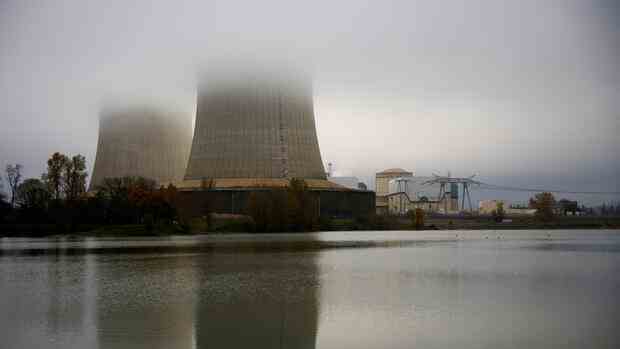In total, EDF’s mountain of debt now amounts to 64.5 billion euros – and is becoming a problem for the French government.
(Photo: REUTERS)
Paris The French energy group EDF reported a record loss of 17.94 billion euros for 2022 on Friday, after a profit of around five billion euros in the previous year. The low production of nuclear power last year had a major impact on the balance sheet.
Altogether, EDF’s mountain of debt now amounts to 64.5 billion euros – and is becoming a problem for the French government, which wants to complete the nationalization of the group by May at the latest.
The rise in energy prices drove EDF’s sales, which increased by 70 percent to 143.5 billion euros. Nevertheless, the group ended up deep in the red because its nuclear reactors produced less electricity last year than they had since 1988.
CEO Luc Rémont also blamed “extraordinary regulatory measures in 2022” for the loss of billions. EDF has to sell nuclear power to the competition at significantly lower prices in order to finance the electricity price cap introduced by the government to combat high energy costs.
Over the past year, more than half of the 56 nuclear reactors in France have been shut down at times. The main reason was an accumulation of routine maintenance that had been postponed during the pandemic.
EDF boss Rémont: Reorganization has priority
In addition, a number of reactors had to be checked for the smallest cracks in the cooling system pipes after problems had been identified in some reactors.
>> Read here: Nuclear power in France: new nuclear power plants at the expense of safety?
The nuclear doldrums made France a net importer of electricity for the first time in decades. The situation has now improved again, and 43 of the 56 reactors are online. For 2023, EDF is targeting nuclear power production of 300 to 330 terawatt hours (TWh), up from 279 TWh last year.
“Our priority is the restructuring of EDF,” said Rémont, who took over the management of the group last autumn at the request of President Emmanuel Macron’s government. “I am convinced that all ongoing actions will bear fruit from 2023 onwards.”
In French government circles it was said that they were taking note of “the deterioration in EDF’s financial situation”. Finance and Economics Minister Bruno Le Maire and Energy Transition Minister Agnès Pannier-Runacher have full confidence in Rémont and the EDF workforce to fully restore nuclear power capacities “as soon as possible”. “The restructuring of EDF’s finances will succeed primarily through an increase in production volume.”
state power
96
percent
is the French state’s stake in the energy group EDF, according to the French financial market regulator AMF.
France is currently reversing the partial privatization of the electricity company from 2005. In the fall, Macron’s government submitted an offer to private shareholders to increase the state’s stake from 84 percent to 100 percent. The French government is paying almost ten billion euros for the takeover.
The deadline for shareholders to accept the offer of twelve euros per share expired at the beginning of February. According to the French financial market regulator AMF, the state’s stake in EDF is now around 96 percent.
Macron’s government also wants to buy up the remaining four percent and then take the group private. But Paris still has to wait for the decision of an appeals court on a lawsuit filed by dissatisfied EDF shareholders. The verdict is due in early May.
Under full government control, EDF is set to invest heavily in nuclear power. Macron has announced the construction of at least six new nuclear reactors. Further expenditure arises from the renovation of existing nuclear power plants, many of which already have operating lives of more than 40 years. The President hopes to extend the life of the reactors to more than 50 years.
More: Nuclear showdown in the EU: Berlin and Paris are fighting over the role of nuclear power in the energy transition

